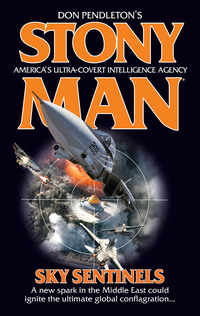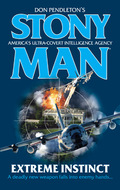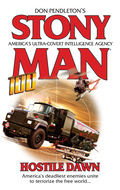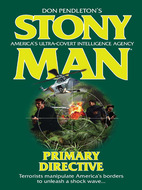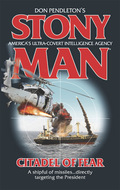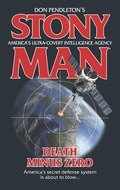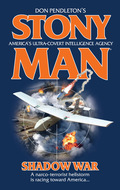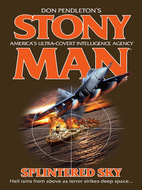Kitap dosya olarak indirilemez ancak uygulamamız üzerinden veya online olarak web sitemizden okunabilir.
Kitabı oku: «Sky Sentinels»
BROGNOLA STOOD WHERE HE WAS, WAITING
“In addition to the church in that cowboy state of yours,” the voice said pompously over the speakerphone, “the third suicide bomber I sent to Israel has just eliminated close to four hundred infidels in Tel Aviv.”
The President remained cool. “I hadn’t even heard of the first two yet,” he said, glancing at Brognola. “They must not have been very big.”
The voice that responded turned angry. “They were exactly the size I wanted them to be.”
Brognola was listening to one of the biggest egos he’d ever encountered in his long career.
“And, Allah willing, there are far bigger things to come,” said the Iranian president.
“Are you declaring war on the United States?” the Man asked.
But the leader of the free world got no response.
All he and Hal Brognola heard was a click as the line went dead.
Sky Sentinels
Don Pendleton
Stony Man ®
America’S Ultra-Covert Intelligence Agency
SKY SENTINELS
CONTENTS
PROLOGUE
CHAPTER ONE
CHAPTER TWO
CHAPTER THREE
CHAPTER FOUR
CHAPTER FIVE
CHAPTER SIX
CHAPTER SEVEN
CHAPTER EIGHT
CHAPTER NINE
CHAPTER TEN
CHAPTER ELEVEN
CHAPTER TWELVE
CHAPTER THIRTEEN
EPILOGUE
PROLOGUE
Wilson “Pat” Patrick took a seat on the rocky ledge and pulled the strap of his canvas briefcase over his head. As he set the bag down at his side, he turned to Buford Davis and said, “Make sure you get those colors flying high, Buff. We can’t be more than a quarter mile from the border.”
Davis had already found a crack between the craggy rocks and jammed the steel pole down as far as it would go. A light wind caught the flag and flattened it out so it could easily be read.
Noncombatants! the slick flag proclaimed both in Farsi and Arabic. And below that was written Newsweek magazine, followed by the periodical’s logo.
Patrick opened his briefcase and pulled out a small tin lunch box. Davis had found another relatively flat surface a few feet away from Patrick and dropped to a sitting position, temporarily setting his camera bag behind him. From somewhere inside the light bush vest in which he carried everything from camera lenses to a Swiss Army knife, he produced a paper sack. He pulled an egg-salad sandwich out of the bag.
The two men heard the tromping of feet behind them and turned slightly to see six members of the FOX News team approaching. Jason Kapka, who was toting a heavy video camera, was the only one Patrick knew. Kapka made the introductions.
Patrick opened his lunch box and pulled out a peanut-butter-and-jelly sandwich as the FOX crew found rocks or ledges where they could stow their gear and sit for lunch. Patrick finished his sandwich and opened a small bag of Cheetos at the bottom of his lunch box. He looked down into the valley that separated them from Iran. A trickling stream of water passed over the rocks at the very bottom of the valley, and although it was actually a few feet inside the Iraqi border, it was generally regarded as the separation line between the two countries.
As he watched broken twigs, flowers and strands of grass float by, he suddenly caught movement in the corner of his eye.
Patrick spotted the heads of two men appear as they marched purposefully over a hill and into view. Both wore red scarves around their necks, earmarking them as members of the Iranian Revolutionary Guards. Officially known as the Pasdarans, these special forces Iranians were fully decked out in khaki uniforms, web gear and carried either American M-16s or Soviet AK-47s.
The M-16s, Patrick knew, were left over from the days when the Shah had ruled Iran. The AK-47s had been acquired from the old Soviet Union, which had been more than happy to arm the Iranians while they held the American hostages shortly after the revolution.
“What do you suppose those two are up to?” asked Court Hough, one of the FOX crew anxiously. Before anyone could answer, another pair of heads appeared. Then another. And it continued until roughly two dozen of the Pasdarans had marched over the hill into view.
“Just out on patrol,” Davis said around a mouthful of egg salad. “Flexing their muscles for us.”
The Americans continued eating their lunches. “They’ll stop down by the stream,” Jason Kapka said. He reached to his side, unzipped his bag and pulled out his camera. “Might as well get some footage of them, though,” he added as he turned back around and rested the camera on his shoulder. “It’s been a boring day. But the suits back home’ll still want tape of some kind.”
The routine-patrol explanation seemed to have calmed the FOX men. When Roger Stehr spoke up, his voice was steady. “Well, I’m sure you Newsweek liberals can find a way to make it look like it was all the U.S.’s fault,” he said.
“And I don’t doubt that by the time we finish lunch, you FOX guys will have written that they killed two dozen babies in some sort of Satanic Muslim ritual,” Davis retorted.
All of the journalists laughed.
But their laughter had an edge to it.
The Americans continued eating as the men with the red scarves around their necks made their way down the embankment to the water. But they all stopped in mid-bite when the Pasdarans sloshed straight across the water and began climbing the bank on the Iraqi side.
Patrick looked quickly to the side and saw that the breeze still held the noncombatant flag straight out. There was no way the Iranians could miss it. And there was no doubting that they knew they were invading another country.
“What the hell are they up to?” Court Hough said in a shaky voice. “Don’t they know where the border is?”
“They know,” Davis said as he continued clicking away with his camera. “They just don’t care.” His eyebrows furrowed. “I don’t like this. No, I don’t like this at all.”
As the squad of Iranians continued to make its way up the hill, one of the newsmen stood. “Look,” he called out in a loud voice as he turned slightly and lifted his arm, tapping the media patch on his shoulder with the fingers of his other hand. “We’re newsmen.”
As he turned and pointed toward the flag Davis had jammed into the ground, one of the lead Pasdarans raised his AK-47 and shot him through the heart. The newsman fell down the bank, past the oncoming Iranians and finally came to rest in the stream, turning the water a dull red as the blood drained from his body.
All the rest of the Americans froze in place. A few seconds later they were completely surrounded.
“Stand up!” an Iranian with sergeant’s stripes ordered as he jammed the muzzle of his M-16 into Patrick’s chest. The Americans complied. Turning to his side, the sergeant rattled off orders in Farsi and a second later four men hurried forward, searching the Americans head to foot and confiscating their equipment and bags.
One of the Pasdarans suddenly turned toward the sergeant and spoke rapidly, holding up a North American Arms .22 Magnum Black Widow he had found. The sergeant stepped away from Patrick and walked toward the two men. Holding out his hand, he took the tiny hideout gun and lifted it to his eyes. “What is this?” he demanded in perfect English. “A toy?”
The American newsman saw a possible opening and took it. “Yes,” he said emphatically. “Just a toy gun. I found it and planned to take it home to my kids to play with.” As soon as the sentence was finished he held his breath.
“I see,” said the sergeant. “So, if it is a toy, this should not hurt.” Pressing the barrel of the little pistol between his captive’s eyes, he cocked the hammer and pulled the trigger.
The .22 Magnum round exploded in the newsman’s brain, sending blood, flesh and chips of skull out both the front and back of his head.
The sergeant turned toward the rest of them. “It seems it is a dangerous toy,” he said, smiling. “It should come with a warning on the box.”
The air filled with laughter.
But it was all Iranian.
The sergeant barked out more orders, and the soldiers who had searched the American newsmen gathered up both the still and video cameras. But instead of taking them as Patrick expected them to, they piled the cameras into the arms of one of the FOX correspondents.
The sergeant looked the man in the eyes. “Take your tape, and your pictures, back to your President,” he said. “Tell him that if he can invade other countries, so can Iran.” Then he aimed the .22 Magnum at the FOX man’s foot, cocked the hammer and pulled the trigger again.
The American’s howl of pain was almost as loud as the explosion.
“That will slow you down a little,” the sergeant said. “But you can still make it back.”
The FOX man had dropped the camera bags and now more Pasdarans lifted the bags and slung them over his shoulders again.
“I think I will keep this toy for myself,” the sergeant said, grinning. More orders in Farsi followed, and suddenly Patrick and Davis found their hands cuffed behind their backs.
“Congratulations,” the sergeant said. “You have the honor of becoming our guests.” He turned one last time to the FOX man who was sweating and trying to stand on one leg, his face contorted in agony. “Go now,” he said. “And tell your president that this is only the beginning.”
A moment later Wilson Patrick, Buford Davis and the remaining three men from FOX were trying not to fall as they were escorted down the embankment toward the stream.
Patrick glanced over his shoulder to see the FOX man begin limping back toward the American base camp.
He wished he had paid more attention to the man’s name.
CHAPTER ONE
The three members of Able Team wore skintight black combat suits as they fell through the sky over Oklahoma City’s south side. Below, Carl Lyons watched the traffic on Interstate 44 as he prepared to pull the ripcord on his parachute.
Local law enforcement had already set up roadblocks surrounding the strike zone. There were already hundreds of law-enforcement officials on the scene. But they had been ordered by the President himself to wait for Carl “Ironman” Lyons, Rosario “Politician” Blancanales and Herman “Gadgets” Schwarz, the three men who made up Stony Man Farm’s crack Stateside counterterrorist squad known as Able Team.
At the last possible second, Lyons jerked his cord and looked up to watch the parachute canopy open above his head. A few feet to the side and a mere foot or two above the canopy, he watched Blancanales and Schwarz do the same.
The three men’s black combat boots all hit the asphalt parking lot of a deserted Pizza Hut in front of the large church at almost the same time. Wasting no time, they cut the lines to their chutes and let them blow away in the strong Oklahoma wind.
Somebody else could pick them up. Right now, Lyons, Blancanales and Schwarz all had more important duties to perform than to worry about littering.
Lyons glanced at a cardboard sign in the otherwise empty window of the Pizza Hut building. It read Future Home Of The Southern Hills Baptist Church Youth Group. He wondered just how many of those young Christian boys and girls would still be alive once the building had been remodeled. Unless he and his team were successful, the purchase of the former Pizza Hut might turn out to have been a bad investment for the church.
Terrorists dressed in khaki uniforms had taken over the sanctuary at approximately ten-fifteen that morning, just as the musical portion of the service was ending and the sermon was about to begin. Some had moved in through the sixteen entrances to the sanctuary with submachine guns and smoke and stun grenades, while others had taken over the balcony and rounded up miscellaneous personnel from the offices and other rooms inside the church. At least one man—an off-duty police officer—had been killed during the siege. The small .38 Smith & Wesson Chief’s Special in the pocket of his sport coat had proved to be no match for the superior fire- and manpower of the invaders.
As Lyons straightened, a burly man with sandy-brown hair, a well-trimmed mustache and wearing a brown suit walked up to him. “I’m Langford,” he said simply. “You must be the guy they called me about?—Agent Lyons.”
Lyons let the M-16 fall to the end of the sling over his shoulder and shook the man’s hand. From the briefing Able Team had held via cell phone as they flew to Oklahoma City he knew that Langford was the director of the Oklahoma State Bureau of Investigation.
“Give me a quick rundown on the situation, will you?” Lyons asked.
“Not a lot to tell you that you didn’t hear during the flight,” Langford said. “We’ve had some sparse communication with the men inside. We’re estimating that there’s about three dozen, total.”
“Any other Feds shown up yet?” Lyons watched the OSBI man’s eyes carefully as he spoke. As a former LAPD police officer himself before joining the Stony Man crew, he was more than familiar with the turf wars between law-enforcement agencies. No one liked having what they thought was his responsibility taken away from him. But he saw no jealousy on Langford’s face as he questioned him.
“Just the OKC office of the FBI,” Langford said. He looked toward a group of men in carefully tailored suits who stood huddled around a minivan. “They got their little feelings hurt when I wouldn’t let them take over the show.” He paused to draw in a breath. “I think they’re arguing about what dry cleaner is the best at stuffing their shirts right now.”
Lyons wasn’t known for joviality, but that one made him smile. “They’re good at that,” he said. Then, changing the subject, he said, “Have the men inside ID’d themselves or given out any demands?”
“No demands yet,” Langford said. “It’s almost like they’re waiting for us to get set up on purpose in order to make the biggest splash possible.”
“That’s a legitimate possibility,” Lyons said, nodding. “Any idea who they are? The briefing we got on the plane said they were all dark-skinned, wearing khakis and shouting what sounded like Arabic to a kid who got away.”
Langford nodded. “We had a brief conversation with the boy. They didn’t claim to be a terrorist group at all. They said they were Iranian Revolutionary Guards. Sounds like a load of crap to me.”
“Me, too,” Lyons said. “The Iranian government openly sponsoring a terrorist attack on a Christian church inside the U.S.? That’s like declaring war.”
“My thoughts exactly,” Langford said. “But they could be Iranian rather than Arabic. Most people around here wouldn’t know the difference between Arabic and Farsi if they heard it side-by-side.”
Schwarz and Blancanales had so far remained silent. Schwarz looked at Langford, “You have any idea where they are inside the church?”
“That kid that sneaked out right at the beginning,” Langford said. “He’d been in the bathroom when the shooting started and the grenades went off, and he ran for the closest exit. He said it looked like they were taking everyone into the sanctuary.”
Lyons felt his jaw tighten as he nodded his understanding. That meant explosives. If the terrorists were armed only with firearms, they’d have spread the hostages out throughout the building. The Able Team leader was about to speak again when a dark red Toyota Tundra pickup pulled up, followed by two black-and-white OCPD cars, sirens blaring and lights flashing. It had obviously run one of the roadblocks.
A man wearing a large turquoise bolo tie, a gray suit, black cowboy boots and a white straw fedora stepped out of the truck while a woman Lyons assumed was his wife stayed inside.
Officers from the two squad cars leaped out after him, guns drawn. Ignoring them and the other officers stationed around the church, the man in the bolo walked toward Langford and Lyons.
Langford held up his hand and shook his head to the uniformed men. They lowered their weapons.
“Somebody you know?” Lyons said.
“Oh, yeah.” The OSBI director grinned. “Retired agent. And I’d forgotten he went to this church.” He paused a moment, then said, “Carl Lyons, meet Gary Hooks. Former agent and close-quarters-combat expert with and without weapons.”
The two men shook hands.
“You’re a little late for the service, Gary,” Langford said.
“We always are,” Hooks said. “My wife can’t stand that canned music they play on Sunday mornings. So we get here just in time for the sermon and sneak into a back pew.” He looked around for a moment, taking in all of the other officers, weapons and equipment. “Then again, maybe God made me late on purpose,” he said. “My guess is none of you know jack about the layout inside of the church.”
“No details or schematics,” Langford said.
“It’s fairly simple,” Hooks said, tightening the turquoise bolo around his neck. “Right behind those front doors is a foyer that is about ten feet wide and circles the sanctuary. But it’s a killing ground. They—whoever they are—could stand just inside the sanctuary itself, with the doors propped back, and kill every one of us who opened one of the outside doors before we even got inside.”
“Any other ways in?” Blancanales asked Hooks. “Ways these guys wouldn’t know?”
“Well,” Hooks said, squinting slightly, “this isn’t ancient Rome and we don’t have any catacombs to hide in. But there’s a way in they may not have thought about, particularly since they’re Muslims and particularly since this is a Baptist church.” He looked up at the roof of the large building. “There’s one way in I think enough of us could use to get the drop on them. That’d give the rest of these guys time to come through the doors,” he said, then cleared his throat. “Your team, Lyons, plus Langford and me. Our job will be to take out the sentries at the sanctuary doors from behind so the SWAT teams and other officers can come in and join us.”
“And just how do you plan to get behind them, Gary?” Langford asked,
Hooks grinned. “Since you’re a Methodist, I wouldn’t expect you to know,” he said.
Langford laughed, and it was obvious to Lyons that this was an old joke between the two old friends. “Don’t worry,” Hooks said. “I’ll show you all the way. But we’ve got to spot and disarm whatever explosives they’ve set up, too. And that could get tricky.” He paused a second and cleared his throat. “You know what this is, Dwayne,” he said, using Langford’s first name. “One giant suicide bombing. Those men inside plan to blow themselves up along with everyone else, and you know it. I know that because they haven’t paid a bit of attention to what we’re doing outside here. Has anyone so much as seen a face in any of those windows?”
Langford shook his head. “But you’re retired, Gary,” he said. “You don’t have to—”
“I’m not retired when somebody tries to blow up my church,” Hooks said. He glanced around. “You’ve got some good men out here,” he added finally. “I know, because I trained most of them in close-quarters combat. But none of them know the inside of that church like I do.”
Langford laughed softly again, then looked at Lyons. “He never was worth a damn at taking orders,” he said.
“I think what he’s saying makes sense,” Lyons said. “We need Hooks to come with us.”
“Then let’s get on with it,” Gary Hooks said.
“I know this is a foolish question, Gary,” Langford said. “But do you have a gun on you?”
“One or two,” said Hooks. “But I need one more.” He turned swiftly and returned to his pickup, kissed his wife, and came back carrying a worn canvas briefcase. A moment later he produced a 5.56 mm Kel-Tec PLR-16 pistol and began stuffing extra loaded magazines into the pockets of his gray suit.
As soon as he returned, Langford turned to a man at his side. “Give me your AR, Don,” he said.
As he grabbed the AR-15 from his subordinate’s hands he said, “Everybody ready?”
Lyons nodded. “Then let’s go. You know the layout,” he said, looking to Hooks, “so you lead the way.”
A second later they were following the man in the gray suit and turquoise bolo tie around the building to the side of the church.
T HE RECENTLY PURCHASED Pizza Hut building was not the only addition the Southern Hills Baptist church had planned. A vacant lot where an old crumbling wood-frame house had been torn down stood adjacent to the church’s gymnasium, and the workmen who were building new Sunday-school classrooms had left several ladders at the site.
While Blancanales stood watch through the windows into the gym to make sure no curious eyes were on them, Lyons, Schwarz, Hooks and Langford hefted the tallest of the ladders and hauled it to the side of the church.
“See anything?” Lyons asked when they had the ladder resting against the brick.
“Nothing but basketball goals and foul lines,” Blancanales said.
Lyons led the way as the other men steadied the ladder, then turned and assisted each of the other men up onto the asphalt roof of the church.
The men made their way as quietly as possible across the top of the building. When they reached an airshaft roughly halfway toward the front of the church, Hooks stopped. “This leads down into the dressing rooms behind the baptistry,” he said. “From there we can step down into the water itself. There’s a curtain that’ll cover us from sight.”
Lyons nodded. It was at this point, he knew, that the leadership of the quickly formed five-man team should return to him. Hooks looked him squarely in the eyes and nodded his acknowledgment.
“Okay, guys,” the former LAPD detective said. “I’ll go first. None of us hit the water until we’re all down. Got it?”
Four heads nodded back at him.
With Hooks’s and Langford’s help, Lyons pried the metal shaft off the hole leading down into the building. His Randall Model 1 fighting knife took care of the screen, and then he lowered himself through the passageway to the tile floor. His boots tapped as they hit the floor and he heard the curtain in front of the water start to move.
Someone had heard him.
And there was absolutely no place to hide.
Ignoring his own order of a moment earlier, Lyons lowered himself into the water of the baptistry and ducked his head beneath the surface, pressing himself as tightly as he could against the wall directly beneath the curtain. Through the water, he could see the curtain move. A bearded man wearing a red scarf with his khaki fatigues and BDU cap peered through the open window.
But he didn’t look down. And a moment later, the curtain closed again.
Lyons rose slowly through the water, acutely aware of the unavoidable sound he was making. But it was evidently not as loud as his drop had been because the curtain remained closed. Climbing up the two steps and back onto the tile floor, he looked upward and motioned for the next man to come down. Lyons caught Schwarz’s legs before they hit the floor, then lowered him silently.
Together the two Able Team operatives did the same for the remaining three men.
Holding a finger to his lips, Lyons then gave hand signals to direct the other men down into the water. He remembered the red scarf the terrorist had worn as he looked through the curtain a minute earlier, and frowned.
These terrorists had claimed to be legitimate Iranian troops. And the red scarf was official issue to the Revolutionary Guard—like the green beret to U.S. Special Forces.
The president of Iran was crazy—few people would argue that point. But was he crazy enough to actually send official troops inside America’s borders and attack a house of worship? Of course anyone could buy a red scarf and tie it around his neck and call himself anything from Revolutionary Guard to Gene Autry if he wanted to. The terrorists could easily be al-Qaeda or Hezbollah or Hamas or some other group simply masquerading as Pasdaran troops.
At this point it didn’t matter. He and the rest of his men could sort that all out after the thousand or so hostages on the other side of the curtain were safe.
Lyons’s M-16 was already soaked with water from his earlier dip beneath the curtain. But that mattered little with modern firearms. It would still fire. So holding it in front of him, he moved slowly to the corner of the curtain and used the barrel to push it slightly to the side.
Directly through the window was a large choir loft, with terrified men and women dressed in robes still sitting in their chairs. Mixed in with them were more men in khaki uniforms and red scarves.
One of them had to be the man who had almost spotted him earlier.
Behind the pulpit, and making full use of the microphone in front of him, another terrorist dressed in identical fatigues and a red scarf stood spouting Islamic terrorist propaganda in broken English. Lyons could hear him demanding that the congregation all convert to Islam immediately or be killed and go directly to Hell.
Other men with AK-47s, Uzis and a variety of other weaponry stood next to the speaker. Still more patrolled the aisles, and in the balcony Lyons could see that the same thing was going on. These men in red scarves—perhaps Iranian Pasdarans, perhaps simple terrorists in disguise—were covering their hostages from every angle.
What interested Carl Lyons most, however, was a red-scarfed man on the stage sitting next to a Caucasian in a blue suit. Lyons suspected the man in the suit was the minister. In his midforties, he had slightly graying hair. He sat quietly. But his face showed no fear. If anything, what emanated from the pastor was confidence and determination.
Next to the minister, on the floor, was a sinister-looking device that appeared to be comprised of Semtex plastic explosives and a glass container that held a dull, cloudy liquid that was turning yellow.
Nitroglycerin. Most people thought it was clear, and it was when it was new. But as the explosive aged, it took on more color.
And more instability. It might even be set off by the vibrations of a gunshot. It was a true IED—Improvised Explosive Device. Unprofessional and unpredictable.
In addition to a pistol in one hand, the man next to the minister held an electronic device that resembled a television remote control in the other. But Lyons knew this device had only one channel.
Explode.
Lyons stepped back through the water. He could never crawl through the window and get to the bomb or the man with the detonator before the bomb was detonated. And if he shot the terrorist, the gunshot itself might cause the explosion of the shaky nitro. Lyons stood there while the rest of his team took turns looking through the curtain to access the situation for themselves. All of them looked at him when they’d seen the explosive.
The Able Team leader moved back to the corner of the curtain and brushed it slightly to the side again. He looked out to lock eyes with the minister he had seen only moments earlier.
Somehow, for whatever reason, the preacher had turned in his seat enough to stare at the baptistry. And somehow Lyons had known he was going to do just that even before he moved the curtain.
The minister slowly nodded at Lyons.
Lyons nodded back. Although he wasn’t sure why or what the nod meant. He only knew that to do nothing meant the sure deaths of two thousand innocent people seated in the congregation.
Turning toward the rest of the men next to him in the water, the Able Team leader whispered individual assignments. Langford and Hooks would take out the guards at the main doors while Schwarz and Blancanales dived through the opening to handle the terrorists on the stage and in the aisles.
Just before he was about to seize the curtain and jerk it back, Schwarz grabbed his sleeve. “What about the bomb?” he said.
“I’m taking care of it,” Lyons said.
Schwarz frowned, then slowly nodded.
Carl Lyons reached up and grabbed the curtain with one hand, holding his M-16 with the other. He took a final look at each of his men, then suddenly ripped the curtain off the front of the baptistry so hard it came completely off the rings that had held it in place along the top of the window.
H AL B ROGNOLA was a well-known face to the Secret Service agents stationed at the White House. So when he walked purposefully through the final metal detector and sent a loud buzzing down the hall, all he got from the men in the dark suits were nods of acknowledgment.
Brognola nodded back as he strode toward the open door to the Oval Office. Stepping inside, he saw that the chair behind the huge desk was empty. But that wasn’t unusual.
So he turned to his left.
Few Americans knew it, but the Oval Office was used primarily for news briefings and meetings with foreign dignitaries. It was a show office. Most of the papers the President reviewed and signed, as well as the rest of the actual work he did, was conducted in a much smaller, more businesslike room next door. And it was from this door that Brognola heard the familiar voice say, “In here, Hal.”
Brognola crossed the freshly vacuumed carpet and entered the work office. The Man was seated at one end of a long leather couch with stacks of paper arranged next to him.
When the President pointed toward the other end of the couch, Brognola dropped down beside the stacked papers. He wore two hats in the U.S. government. To the public, he was a high-ranking official within the U.S. Department of Justice. But behind the scenes, he was also the Director of Sensitive Operations for Stony Man Farm.
Today, however, he had no doubt which role the President would be expecting him to assume. Had the Man simply had Justice Department business on his mind, he’d have conducted it over the phone.
Ücretsiz ön izlemeyi tamamladınız.

